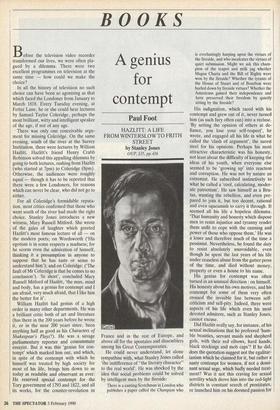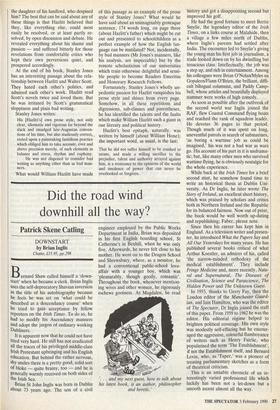BOOKS
A genius for contempt
Paul Foot
HAZLITT: A LIFE FROM WINTERSLOW TO FRITH STREET by Stanley Jones OUP, B5, pp.416 Before the television video recorder transformed our lives, we were often pla- gued by a dilemma. There were two excellent programmes on television at the same time — how could we make the choice?
In all the history of television no such choice can have been so agonising as that which faced the Londoner from January to March 1818. Every Tuesday evening, at Fetter Lane, he or she could hear lectures by Samuel Taylor Coleridge, perhaps the most brilliant, witty and intelligent speaker of the age, if not of any age.
There was only one conceivable argu- ment for missing Coleridge. On the same evening, south of the river at the Surrey Institution, there were lectures by William Hazlitt. Hazlitt's friend Henry Crabb Robinson solved this appalling dilemma by going to both lectures, rushing from Hazlitt (who started at 7pm) to Coleridge (8pm). Otherwise, the audiences were roughly equal — though it has to be reported that there were a few Londoners, for reasons which can never be clear, who did not go to either.
For all Coleridge's formidable reputa- tion, most critics confirmed that those who went south of the river had made the right choice. Stanley Jones introduces a new witness, Mary Russell Mitford. She wrote of the gales of laughter which greeted Hazlitt's most famous lecture of all — on the modern poets; on Wordsworth ('His egotism is in some respects a madness; for he scorns even the admiration of himself, thinking it a presumption in anyone to suppose that he has taste or sense to understand him); and on Coleridge: ('The fault of Mr Coleridge is that he comes to no conclusion'). 'In short', concluded Mary Russell Mitford of Hazlitt, 'the man, mind and body, has a genius for contempt and I am afraid, very much afraid, that I like him the better for it'.
William Hazlitt had genius of a high order in many other departments. He was a brilliant critic both of art and literature (has there in the 200 years before he wrote it, or in the near 200 years since, been anything half as good as his Characters of Shakespear's Plays?). He was a savage parliamentary reporter and consummate essayist. But it was this 'genius for con- tempt' which marked him out, and which, in spite of the contempt with which he himself was treated by high society for most of his life, brings him down to us today as readable and observant as ever. He reserved special contempt for' the Tory government of 1793 and 1822, and all its works, for the counter-revolution in France and in the rest of Europe, and above all for the apostates and dissemblers among his Great Contemporaries. He could never understand, let alone sympathise with, what Stanley Jones called 'the indifference of "the literary character" to the real world'. He was shocked by the idea that social problems could be solved by intelligent men by the fireside:
There is a canting Scotchman in London who publishes a paper called the Champion who is everlastingly harping upon the virtues of the fireside, and who inculcates the virtues of quiet submission. Might we ask this cham- pion of the teapot and milk jug whether Magna Charta and the Bill of Rights were won by the fireside? Whether the tyrants of• the House of Stuart and of Bourbon were hurled down by fireside virtues? Whether the Americans gained their independence and have preserved their freedom by quietly sitting by the fireside?
His indignation, which raced with his contempt and grew out of it, never turned him (as such fury often can) into a recluse. 'By setting the opinion of others at de- fiance, you lose your self-respect', he wrote, and engaged all his life in what he called the 'clash of argument', the surest steel for his opinions. Perhaps his most attractive characteristic was his honesty, not least about the difficulty of keeping the ideas of his youth, when everyone else seemed to be 'growing up' into reaction and corruption. He was not by nature an extremist. He subscribed instinctively to what he called a 'cool, calculating, moder- ate patriotism'. He saw himself as a Bru- tus, wanting the rebellion, and even pre- pared to join it, but too decent, rational and even squeamish to carry it through. It seemed all his life a hopeless dilemma. 'That humanity and honesty which dispose men to resist injustice and tyranny render them unfit to cope with the cunning and power of those who oppose them.' He was a loner and therefore much of the time a pessimist. Nevertheless, he found the duty to resist absolutely unavoidable, even though he spent the last years of his life under ceaseless abuse from the gutter press of the time, and died without money, property or even a house to his name.
His genius for contempt was often turned in an unusual direction : on himself. His honesty about his own motives, and his contempt for some of them very often crossed the invisible line between self- criticism and self-pity. Indeed, there were aspects of his life which even his most devoted admirers, such as Stanley Jones, cannot excuse.
Did Hazlitt really say, for instance, of his sexual inclinations that he preferred 'hum- ble beauties, servant maids and shepherd girls, with their red elbows, hard hands, black stockings and mob caps'? If he did, does the quotation suggest not the egalitar- ianism which he claimed for it, but rather a nasty contempt for women, if not a domi- nant sexual urge, which badly needed treat- ment? Was it not this craving for sexual servility which drove him into the red-light districts in constant search of prostitutes, or launched him on his doomed passion for the daughter of his landlord, who despised him? The best that can be said about any of these things is that Hazlitt believed that they, like everything else, could most easily be resolved, or at least partly re- solved, by open discussion and debate. He revealed everything about his shame and passion — and suffered bitterly for those revelations from comfortable critics who kept their own perversions quiet, and prospered accordingly.
At the end of his book, Stanley Jones has an interesting passage about the rela- tionship between Hazlitt and Walter Scott. They hated each other's politics, and admired each other's work. Hazlitt read Scott's novels twice and loved them. But he was irritated by Scott's grammatical sloppiness and plain bad writing.
Stanley Jones writes:
His [Hazlitt's] own prose style, not only clear, idiomatic and vigorous far beyond the slack and smudged late-Augustan conven- tions of his time, but also studiously correct„ rested upon a painstaking fastidious practice which obliged him to take account, over and above precision merely, of such elements as balance and stress, rhythm and euphony. . . . He was not disposed to consider bad writing as anything other than as had man- ners.
What would William Hazlitt have made
of this passage as an example of the prose style of Stanley Jones? What would he have said about an unimaginably grotesque sentence, 174 words long, on page three (about Hazlitt's father) which might be cut out and presented to schoolchildren as a perfect example of how the English lan- guage can be mutilated? Not, incidentally, by bad manners (Mr Jones's manners, like his analysis, are impeccable) but by the remote scholasticism of our universities which train otherwise delightful and sensi- ble people to become Readers Emeritus and Honorary Research Fellows.
Fortunately, Stanley Jones's wholly un- pedantic passion for Hazlitt vanquishes his prose style and shines from every page. Somehow, in all these repetitions and digressions, sub-clauses and parentheses, he has identified the talents and the faults which make William Hazlitt such a giant in our literary and political history.
Hazlitt's best epitaph, naturally, was written by himself (about William Hone); the important word, as usual, is the last:
That he did not suffer himself to be crushed to atoms, and made a willing sacrifice to the prejudice, talent and authority arrayed against him, is a resistance to the opinions of the world and insolence of power that can never be overlooked or forgiven.



















































 Previous page
Previous page